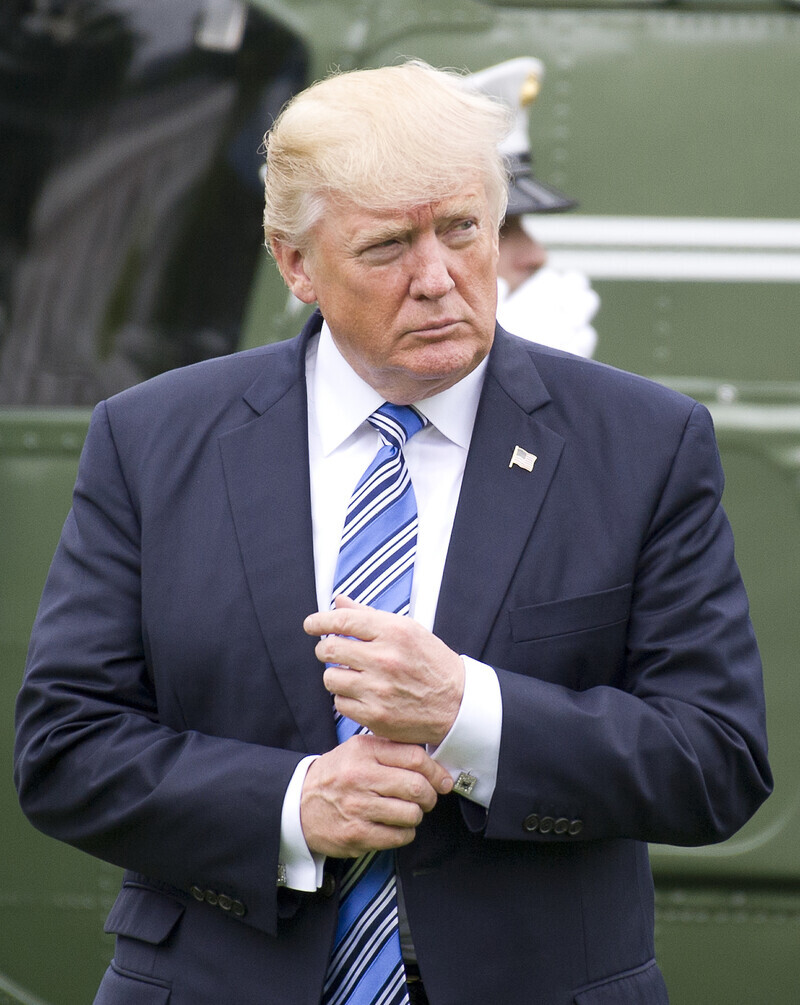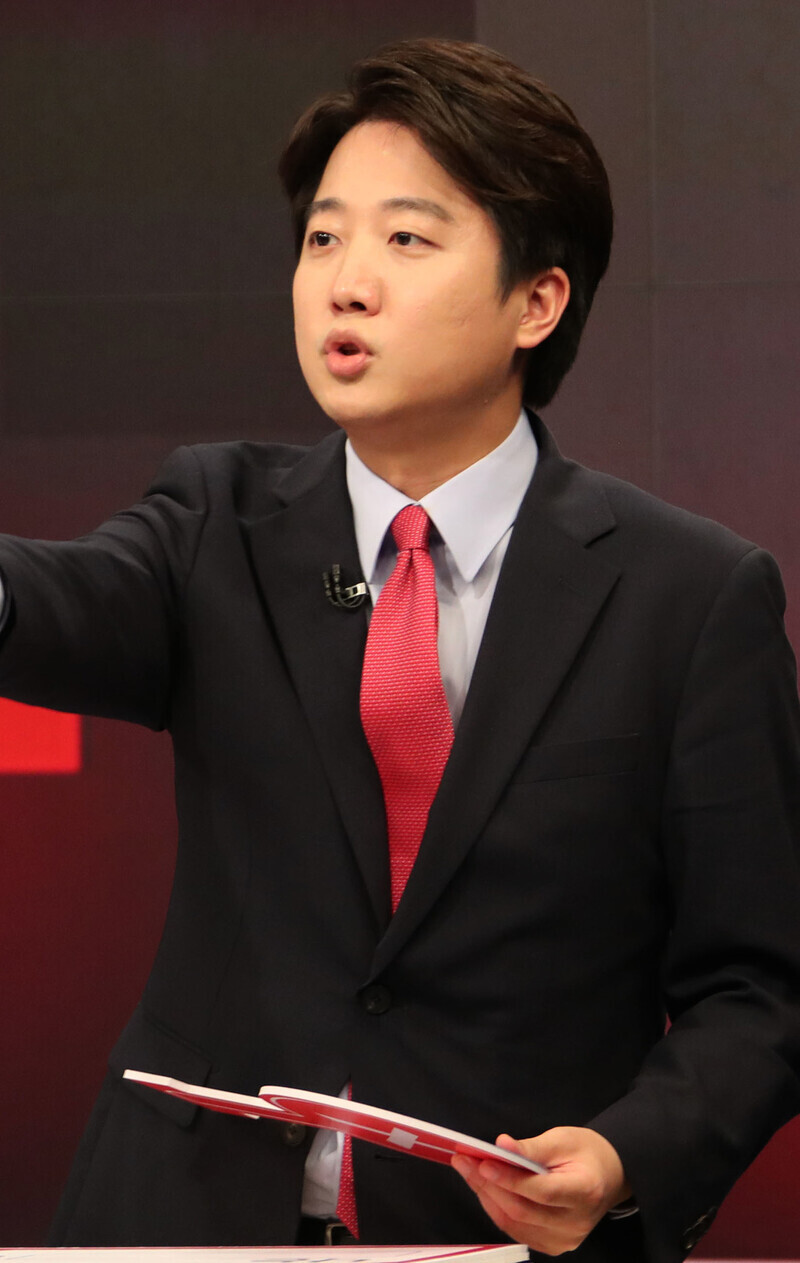hankyoreh
Links to other country sites 다른 나라 사이트 링크
[Reporter’s notebook] Professing “reverse discrimination,” new 36-year-old opposition leader shares much in common with Trump

A lot of attention had been focusing on when and how South Korea would see its own version of “Trumpism,” driven by a form of right-wing populism that repudiates established elites on both sides and espouses totalitarian social and cultural values.
Now South Korea has been visited by its very own Donald Trump, albeit in the form of someone representing a very different age and style: Lee Jun-seok.
Initially, many had speculated that Trump’s specter would appear in the form of former Liberty Korea Party leader Hong Joon-pyo, who resembles him in age and approach. Hong’s similarities to Trump include his disparaging attitude toward established elites on the left and right, his active advocacy of conservative right-wing values, and his unreserved, macho style in speech and behavior.
Instead, Trump has been summoned through Lee Jun-seok, a figure with a style diametrically opposed to Hong’s — and turned him into the leader of the People Power Party (PPP).
Trump was elected US president as the anti-Democratic Party attitudes of the Republican Party’s traditional support base combined with discontent among a less-educated white lower middle class.
Lee’s election as PPP leader similarly came about when the anti-Democratic Party attitudes of the party’s support base — and their urgent wish to regain control of the South Korean presidency — combined with discontent among the younger demographic in their 20s and 30s.
In the US, the backdrop behind the Trump presidency was the election of Barack Obama as the first Black president in US history. In South Korea, the backdrop has been disappointment with the Moon Jae-in administration, which emerged out of a candlelight revolution for the impeachment of former President Park Geun-hye.
What they have in common is a failure to meet the expectations that people had for a liberal and progressive administration.
The drive to regain power among the respective support bases of the US Republican Party and the PPP are reflections of the discontent that the less educated white US lower middle class and young South Koreans in their 20s and 30s feel toward the existing elites on the left and right and the establishment generation.
In both cases, they chose a new figure rather than an established politician. But while the public craves the new, they also want familiarity. That’s how we ended up with Trump and Lee, both figures who had received the kind of mass media exposure reserved for entertainers.
With “new familiarity” as a prerequisite, Hong Joon-pyo never stood a chance. He also lacked another prerequisite: Trump was a multimillionaire envied by the American public, while Lee had the “perfect resume” dreamed of by young people in South Korean society.
With his coarse way of speaking and preposterous claims, Trump differs in approach from Lee, who speaks in a polished way and eschews making irrational statements. But the content that comes across is no different.
Both of them talk about “reverse discrimination” and “fair competition.” They claim that the majority or mainstream are being discriminated against compared with the minority and non-mainstream.
The less educated white lower middle-class voters who support Trump are angry at what they see as their “fair share” having been taken away by minority ethnic groups and immigrants. The 20- and 30-something South Koreans who back Lee — young males in particular — claim that policies favoring females and disadvantaged groups are “unfair competition.”
Trump has routinely engaged in racial incitement, blaming progressives and people of color for racist rioting provoked by white nationalists. He filled his Cabinet and White House with white people — middle-aged white men in particular — and then claimed that this was a fair outcome based on ability.

Lee titled his book “Fair Competition,” claiming that competition is not fair when the system assigns additional points to women, young people and the disadvantaged.
“A world where everyone is free is a jungle,” he insists. “Survival of the fittest, dog-eat-dog — those are the principles of nature.”
Herein lies the contradiction for Trump, Lee and the people who support them.
When Trump and Lee proclaim that “survival of the fittest” and “dog-eat-dog” represent fair competition, they can present themselves as the obvious choices since they are winners by that logic.
Yet the ones who support Trump and Lee are people who feel aggrieved about losing out within that very reality. It’s an ironic situation where two of the biggest beneficiaries of the existing system come to speak for the disgruntled people marginalized within it.
We also need to consider how much progressive identity politics have contributed to the welcome Trump and Lee have received.
Since the revolutions of 1968, progressives have been unable to gather momentum behind movements to improve the socioeconomic status of society as a whole. A large part of their politics of mobilization now relies on the identities of minorities and disadvantaged segments.
At a time of growing polarization, tense culture wars have been fought over sensitive identity issues such as ethnicity, gender and religion — and in the process, many of the lower middle-class people who should be driving forces in progressive movements have turned to conservatism. This was part of the context behind Trump’s emergence.
Now Trump has arrived in South Korea in the form of Lee Jun-seok.
By Jung E-gil, senior staff writer
Please direct comments or questions to [english@hani.co.kr]

Editorial・opinion
![[Guest essay] The real reason Korea’s new right wants to dub Rhee a founding father [Guest essay] The real reason Korea’s new right wants to dub Rhee a founding father](https://flexible.img.hani.co.kr/flexible/normal/500/300/imgdb/original/2024/0423/8317138574257878.jpg) [Guest essay] The real reason Korea’s new right wants to dub Rhee a founding father
[Guest essay] The real reason Korea’s new right wants to dub Rhee a founding father![[Column] ‘Choson’: Is it time we start referring to N. Korea in its own terms? [Column] ‘Choson’: Is it time we start referring to N. Korea in its own terms?](https://flexible.img.hani.co.kr/flexible/normal/500/300/imgdb/original/2024/0423/3617138579390322.jpg) [Column] ‘Choson’: Is it time we start referring to N. Korea in its own terms?
[Column] ‘Choson’: Is it time we start referring to N. Korea in its own terms?- [Editorial] Japan’s rewriting of history with Korea has gone too far
- [Column] The president’s questionable capacity for dialogue
- [Column] Are chaebol firms just pizza pies for families to divvy up as they please?
- [Column] Has Korea, too, crossed the Rubicon on China?
- [Correspondent’s column] In Japan’s alliance with US, echoes of its past alliances with UK
- [Editorial] Does Yoon think the Korean public is wrong?
- [Editorial] As it bolsters its alliance with US, Japan must be accountable for past
- [Guest essay] Amending the Constitution is Yoon’s key to leaving office in public’s good graces
Most viewed articles
- 1[Guest essay] The real reason Korea’s new right wants to dub Rhee a founding father
- 2Terry Anderson, AP reporter who informed world of massacre in Gwangju, dies at 76
- 3[Column] ‘Choson’: Is it time we start referring to N. Korea in its own terms?
- 4Why Korea shouldn’t welcome Japan’s newly beefed up defense cooperation with US
- 5[Column] The clock is ticking for Korea’s first lady
- 6[Editorial] Japan’s rewriting of history with Korea has gone too far
- 7Opposition calls Yoon’s chief of staff appointment a ‘slap in the face’
- 8Video evidence surfaces showing Korean comfort women were massacred by Japanese military
- 9Senior doctors cut hours, prepare to resign as government refuses to scrap medical reform plan
- 10New AI-based translation tools make their way into everyday life in Korea